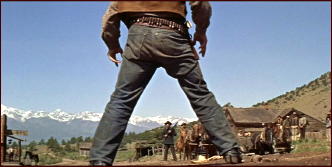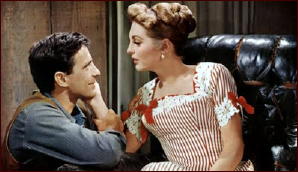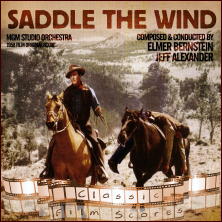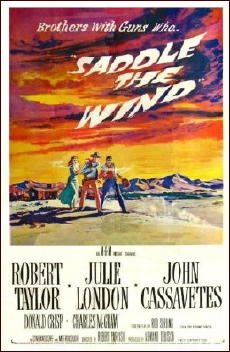Mon 2 Jun 2014
A Western Movie Review by Jonathan Lewis: SADDLE THE WIND (1958).
Posted by Steve under Reviews , Western movies[23] Comments
SADDLE THE WIND. MGM, 1958. Robert Taylor, Julie London, John Cassavetes, Donald Crisp, Charles McGraw, Royal Dano. Screenplay: Rod Serling, based on a story by Thomas Thompson. Music by Elmer Bernstein. Directors: Robert Parrish & John Sturges, the latter uncredited, according to IMDb.
Saddle The Wind is a Western set on the frontier in the post-Civil War era. Veteran actor Robert Taylor and a youthful John Cassevetes, the latter in one of his earliest film roles, portray brothers Steve and Tony Sinclair, respectively. The two men are irreparably divided over the necessity and propriety of violence. Joining them on their journey into fatal conflict is singer/actress Julie London who portrays Tony Sinclair’s mysterious love interest, Joan Blake.
The film is as much a Greek tragedy set in the American West as it is a traditional Western. The themes of personal fate, hubris, and historical inevitability all feature strongly in both the film’s text and subtext.
The philosophical question of whether a man is born bad or goes bad because of his environment — the age-old question of nature versus nurture — is both explicitly and implicitly touched upon throughout the film. Saddle The Wind also explores the effects and ramifications of violence on men and women, and societies more generally.
The film begins with a depiction of frontier aggression and violence. Larry Venables (a mean-looking Charles McGraw) enters a tavern, demands service, and aggressively queries for the whereabouts of Confederate veteran Steve Sinclair (Taylor). But it’s not Steve with whom Venables ends up doing battle. Rather, it is younger brother Tony, whom Steve always believed had something wrong with him when it came to violence, who engages in a standoff with Venables.
Tony shoots and kills Venable, setting off a chain of events that spin out of his control. The sick thrill of murdering a man, even if it were justified, goes to Tony’s head. With liquor, his wildness only increases. Soon Tony and a friend are out making trouble for what they perceive to be gathering of local squatters. Leading the group is Clay Ellison (Royal Dano), a Union veteran from Pennsylvania who has a deed to the land.
It’s not long until Tony Sinclair is angry at — and violent toward — almost anyone who crosses his path, including the local patriarch and landowner, Dennis Dineen (Donald Crisp). This turns out to be a big mistake, and it ends up with older brother Steve having to put an end to his younger brother’s reign of terror. The film culminates in a final, violent showdown between the Brothers Sinclair. The camera work, particularly the angles at which the actors are captured on film, and the music leading up to this crucial event are memorable.
Without giving away the ending, let’s just say that you may slightly caught off guard. (I watched it a second time just to make sure I understood it correctly.) I wasn’t expecting the film’s main conflict to resolve itself in the manner that it did, but if one does consider it to be a Greek tragedy set in the West, rather than a Western, it all makes perfect sense.
The film’s biggest flaw, ironically, may have been in casting Julie London for the role of Joan Blake. While London is certainly captivating and her singing of the movie’s eponymous title song has its saccharine charm, her character just comes across as somewhat inauthentic.
It’s hinted that she’s running from a violent past. Nevertheless, would a woman of her looks and her presumed social status really have joined up so quickly with an obvious immature hothead like Tony Sinclair after knowing him for less than a week? It strains credulity.
In many ways, Joan Blake is extraneous to the overall taut plot; the conflict between the sober, elder brother Steve and the reckless, younger brother Tony would have likely come to a head even without her presence in their midst. By not further developing the sole significant female character in the film, Serling weakened his overall solid script and made London’s contributions to Saddle The Wind less impressive than they could have been.
Although Saddle The Wind is unquestionably a Western, there is something very noir about the film, with Cassavetes’s character increasingly spiraling into a hellish realm of senseless violence, all of which culminates in his inevitable doom. None of the characters are remotely happy, at least not for very long.
The closest we see to true happiness is at the beginning of the film, when Tony Sinclair returns home and is reunited with his brother. From then on, no one really is remotely cheerful, at least not in any normal sense.
All the characters seem more resigned to their places in the world than particularly happy with them. Violence, death, loneliness, and struggle rule the land. It’s a bleak land, and one does one’s best to make the most of a less than optimal situation. Perhaps this was Rod Serling’s view of the American West?
In conclusion, Saddle The Wind is a unique film, somewhat distinct from the typical Western narratives of the era. In many ways, it’s a film about a loser rather than one about a hero. But it’s very much worth watching. With solid acting, great scenery, and a beautiful soundtrack composed by Elmer Bernstein, it’s a film that you won’t soon forget, particularly if you really consider what’s really going on with all the characters under their tough Western exteriors.





June 3rd, 2014 at 3:14 am
There’s something about Julie London’s Westerns: they’re somehow a bit more intelligent/off-beat than the norm. SADDLE THE WIND, MAN OF THE WEST and THE WONDERFUL COUNTRY are a far cry from her modest start in NABONGA.
June 3rd, 2014 at 5:11 am
Agreed.
And I’d definitely say that Saddle The Wind is off-beat. Definitely not a “typical” Western.
June 3rd, 2014 at 10:26 am
The film failed commercially and Robert Taylor, while fine in his part, is not and could not be the brother of John Cassavetes. Not in style, body language or ethnicity. As for Julie London, I like her but did not find her work effective in this.
June 3rd, 2014 at 11:58 am
On the other hand, set this same story and cast, in New York or Chicago during the Prohibition era, and you have an effective, if somewhat pretentious, project.
June 3rd, 2014 at 12:26 pm
#3. Barry
I have not seen the film but I have watched the trailer, and no, I cannot see Taylor and Cassavetes as even remotely related. Casting implausibilities such as this tend to ruin a film for me, or at least make it very difficult to watch. Not without some effort on my part.
June 3rd, 2014 at 1:37 pm
Cassavetes’s acting is more than adequate, but I do agree that he was definitely not the best choice to portray a character related to Robert Taylor’s character. Like the casting choice of London, it just takes away from the plot.
On the other hand, the theme of the film was that these two brothers are so radically different in temperament and Taylor’s character is at a loss to explain to himself how and why Tony Sinclair (Cassavetes) ended up the way he did. Personally, I think they could have cast McGraw as Taylor’s brother but for the age difference which they clearly were going for
June 3rd, 2014 at 1:41 pm
The plot could have worked well in 1920s Chicago. London would have worked more effectively as a casting choice
June 3rd, 2014 at 8:18 pm
You know Hollywood casting? I never bought Robert Wagner, Hugh O’Brien or Richard Widmark as Spencer Tracy’s sons in Broken Lance either much less Earl Holliman as Anthony Quinn’s in Last Train From Gun Hill. Elvis as Richard Egan’s ‘half’ brother was even a stretch. Then again I love John Ford’s Four Men and a Prayer, and who could believe C. Aubrey Smith fathered George Sanders, David Niven, Richard Greene, and Richard Cromwell.
I tend to give Hollywood a lot of leeway on this save when it just slaps you upside the head as it does here.
Not a great Julie London role, though I liked her as a recording artist more than actress. Beautiful sultry woman though in the right part. I would just prefer to listen to her sing.
This was at the height of the ‘adult’ western fad and perhaps, thanks to Serling, a tad to pretentious for its own good. It is still worth seeing. For that matter Thomas Thompson’s westerns were always a bit odd too, however good they were.
This same theme works better in Vengeance Valley with Burt Lancaster and Robert Walker unlikely brothers but much better matched in style if not physically. It is this film without the pretension, and a good Luke Short source story.
Jonathan mentions noir, and there are noir westerns — famously Blood on the Moon, Station West (both based on Luke Short material), and Pursued. Of course they aren’t officially noir anymore than historical films like So Evil My Love are, but they are highly influenced by noir film.
I like this film despite its short comings, but it is more an interesting failure than a real success. I did think Taylor, Crisp, McGraw, and Royal Dano contributed the best elements of the film. I’m not a Cassavettes fan, and I don’t think he handled a western well anymore than he did Shakespeare in The Tempest. Frankly I found him a very limited actor, fine within certain parameters, but unable to go outside his comfort zone. I enjoyed him in Johnny Staccato and in Machinegun McCain, but I found the films he directed incredibly pretentious and boring and his acting style a poor man’s Brando without Brando’s range.
Frankly westerns seldom work when you try to use alternate or ‘interesting’ casting. Paul Newman did better later, but in Left Handed Gun his Billy the Kid is just terrible and Gore Vidal’s homoerotic screenplay laughable.
June 3rd, 2014 at 8:59 pm
There are certain actors who just do Westerns well even though they aren’t really best known for Westerns (Tom Selleck) and others who just seem completely out of place. Some, like Kirk Douglas, are somewhere in the middle. Capable, but not as authentic as many others.
I’m a fan of independent cinema and always appreciated early Scorsese and directors like Demy, John Carpenter, Atom Egoyan, and David Cronenberg. I really can’t say the same for Cassavetes. I take a look at his films and they really just don’t appeal all that much to me.
Pursued with Mitchum has the look and feel of a film noir. I’ve always seen the Coen Brothers’ “Blood Simple” as a cross between a contemporary Western and neo-noir
June 3rd, 2014 at 9:01 pm
Incidentally, my first introduction to London was in “Emergency!” a show I loved in my childhood. She co-starred with her then husband
June 3rd, 2014 at 9:10 pm
In Vengeance Valley Burt Lancaster and Robert Walker are not biological brothers, but adoptive. But, point taken that stylistically they belong is the same film. On a personal note, and I agree with you about having love for Four Men And A Prayer, but I believe Niven, Sanders and Greene could be brothers, and Bill Henry, not so bad. And certainly fathered by C. Aubrey.
June 4th, 2014 at 4:38 am
It’s interesting that some actors can do Westerns, and others can’t. The truth is that the Western is actually a sub-genre of the historical movie. Someone like Glenn Campbell is totally convincing as a Texas Ranger in TRUE GRIT, whilst the much more talented Cagney and Bogart are wincingly unconvincing in THE OKLAHOMA KID. The latter two just feel far too ‘modern’ and urbane to be cowboys. The same with Cassavetes.
June 4th, 2014 at 5:27 am
That’s an interesting observation. When one considers that Westerns are, as you say, a sub-genre of historical films, it also makes sense that some historical drams set during the Revolutionary War in the nascent United States or in France at the time of the French Revolution, in particular, don’t work for a similar reason: some of the actors just come across as too “contemporary” to be believable
June 4th, 2014 at 9:40 am
This discussion is very interesting.
I’ve tended to take the opposite point of view: The Western is interesting in part because anybody and anything can appear in it. Westerns can include mystery, comedy, romance, medical drama, social commentary, religion, and just anything else one can imagine. The same is true of genres like detective fiction and science fiction. Like the Western, they are “absorbing” genres that can and do soak up anything.
Andrew Sarris: “The Western, like mineral water, gains flavor from its impurities.”
Wikipedia: “On February 10, 1967, Agnes Moorehead portrayed Miss Emma Valentine in “The Night of the Vicious Valentine” on The Wild Wild West, a performance for which she won a Primetime Emmy Award for Outstanding Supporting Actress in a Drama Series.”
Moorehead played a full steampunk genius, with a sinister invention as big as a barn with which she tried to kill people.
In Phantom Empie, Gene Autry discovers a whole advanced civilization underneath his ranch, complete with super-science. He commutes between this underground world and the surface, getting back in time to make his singing cowboy appearances on radio.
TV series like “Wagon Train” and “The Virginian” specialized in getting guest stars who were not associated with Westerns. Broadway sophisticate Tammy Grimes is no-one’s idea of a Western star. Still, she and James Drury were wonderful together on The Virginian.
June 4th, 2014 at 3:31 pm
Food for thought, Mike!
I tend to see the Western as a great vehicle for telling universal stories, tales that could just have easily been set in another place, time, and culture. That’s one reason why I like “Fistful of Dollars” so much. It’s also “Red Harvest” (Hammett) and “Yojimbo” (Kurosawa). Still, as an actor, Clint Eastwood makes the movie. He just works well in Westerns.
June 4th, 2014 at 5:45 pm
Everything Mike Grost wrote makes sense, but sometimes things simply don’t work or make sense. Cassavetes and Taylor are an example. If Tammy Grimes worked well with Drury, well — why not. In the same way Stewart Granger was okay on The Virginian, not so okay in Gun Glory and fine in The Last Hunt. All westerns with an English star. It simply depends on theatrical and dramatic circumstance.
June 4th, 2014 at 5:49 pm
David,
I see you briefly mentioned Machine Gun McCain. I recently bought that but haven’t watched yet. Will do so
June 4th, 2014 at 5:59 pm
Actually Cagney did a fine little western, Tribute to a Badman with Katie Jurado. Based on a novel by Jack Schaefer (Shane).
Errol Flynn (who was called the million dollar Roy Rogers) proved fine in westerns, though they usually made him an Irishman (not always, he’s a Texan in San Antonio and of course Custer and Jeb Stuart).
I agree with Mike that the western is elastic. Who would have thought Donald Pleasance would give such a brilliant funny performance as the mountain man Oracle in Hallelujah Trail, Joseph Cotton proved an able western performer, and Kenneth More did a funny western spoof with Jayne Mansfield.
Of course he was Little Beaver to Red Ryder early on, but Robert Blake always struck me as a very contemporary actor, yet he was fine in Tell Them Willie Boy is Here. Robert Young did a few good westerns and Tyrone Power was at his best with Susan Hayward and Hugh Marlowe (another unlikely western star) in Rawhide.
Bogart was ludicrous in his two westerns, but then Bogie as a Mexican bandit? Edward G. Robinson though was powerful in The Violent Men.
Still there are actors best suited to certain roles and periods. I never did quite get over Denzel Washington as a palace guard in Branagh’s 13th century Hamlet. For that matter, silly or not, did anyone but me have a problem buying Will Smith as Major James West in the Wild Wild West? Fantasy or not there wasn’t a black officer in the army for another twenty years or more (ironic, because during the Civil War the South did have black officers — towards the end of the war slaves were being freed to fight as soldiers and had black officers, plus several black captains were much admired blockade runners in Richmond, Charleston and Savannah). It proved too much of a leap for me and I’m a fan of Smiths (black cowboys on the other hand were ubiquitous, of the 10,000 actual cowboys in the old west, fully 7,000 were black despite the movies*). At least they explained Jackie Chan and Toshiro Mifune in westerns.
I try not to be a literalist and play along, but there is a point where instead of pulling the wool over your eyes they are kicking dirt in them.
*Movies and western novels aside an actual cowboy was a homeless drifter who seldom owned his own horse, saddle, or gun — all provided by the rancher. If you owned land and cattle you weren’t technically a cowboy even though you had the same skills. It may be a romantic term now, but prior to Buffalo Bill and Owen Wister cowboy’s were little better than bums in most eyes, at least in the barely twenty years the Old West truly existed and cowboys with it.
June 4th, 2014 at 9:11 pm
David Vineyard:
Re Bogart. Awful in his 19th century westerns, excellent in Treasure of Sierra Madre. Possibly time frame and era are more important than genre. And, while we are at it, hope you noticed the comment(s) re Vengeance Valley and Four Men And A Prayer …etc.
June 4th, 2014 at 10:44 pm
Great discussion. I recently revisited Cassavetes’ MINNIE AND MOSKOWITZ, which made me rethink his work as actor and director. It’s a deeply disturbing film in which men abuse a woman (the incomparable Gena Rowlands), as if it were telling revealing truths about adult relationships. Seemed so wrong-headed, misogynistic, and OTT, I finally gave up on it.
June 4th, 2014 at 11:49 pm
Ron,
Right.
June 8th, 2014 at 4:20 pm
Agree Ron and Barry, there is a point where realism can become just disagreeable.
Thought it is a great film with a great performance, there is a passage in Marty that always demonstrates the limits and drawbacks to me when Marty and friend are going our for the night. Something to the effect of:
What do you want to do?
I don’t know, what do you want to do?
I don’t know what do you want to do …
The only thing he left out were the uhhs, ahhs, and ya’ knows, ya know.
Barry,
William Prince of course, always confuse him and Cromwell. Actually it wasn’t impossible to imagine Taylor and Cassavettes as physical brothers, but that they had grown up within a thousand miles of each other. They were half brothers in Broken Lance, but Katy Jurado as his Mom or not it was tough to buy Richard Widmark, Hugh O’Brien, and Wagner as vaguely related.
I grant that in Four Men and a Prayer that the uniformly good acting and script made it less a stretch, and at least three of the actors were physically imposing enough to buy as brothers and Smith’s sons. Maybe they should have hired Tom Conway and Patrick McNee if they had Sanders and Niven in it (McNee is Niven’s cousin).
By the by Barry, if you can find it the novel by David Garth is almost as much fun as the film, and though forgotten today, most of Garth’s adventure novels are worth a read.
Oddly enough absolutely the worst possible casting, John Wayne, Dean Martin, Earl Holliman, and Michael Anderson as brothers in The Sons of Katie Elder work just because it is an entertaining movie and they all compliment each other.
Of course you can’t always be as ideal as Jim Mitchum as his Dad’s little brother in Thunder Road or Tom Conway as Tom Lawrence in The Falcon’s Brother. You did have to wonder though in Big Jake with Chris Mitchum as Big John’s son and Patrick’s brother if Maureen O’Hara had wandered a bit from the marriage bed.
Some films are unintentionally as funny as the concept of Arnold and Danny DeVito as Twins.
June 8th, 2014 at 10:02 pm
Henry, not Prince
I’m in the middle of rewrite on two books and a short story and my mind more muddled than ever. I have to keep reminding myself which one I’m working on, which is why I seldom have a protagonist with a name longer than five or six letters if I can avoid it.